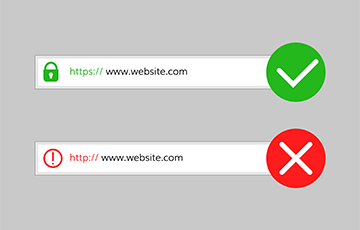Why is web security important?
Web security is important for all businesses whether big or small. Small businesses often find it difficult to protect themselves from an extensive range of potential cyberattacks as they fail to have adequate resources and usually don't know they have become vulnerable until it's very late.
Web security is gaining importance with the growing development of more sophisticated hacking attacks. People-owning websites focus on keeping hackers and cyber thieves from accessing sensitive data. Without a proactive security strategy, businesses risk the spread and increase of malware, networks, attacks on other websites, and other IT infrastructures. If a hacker is successful, attacks can very easily spread from computer to computer, making it more complicated to find the origin.
If you run a website whether personal or business, then ensuring that it is secure is important for several reasons, some of which have been listed below:
- Prevent phishing emails from being sent through your website
- Reassure your website visitors that your website is safe
- Obtain better ranking in the search engines like Google
- Prevent malware from being uploaded to your site
- Protect your business from getting hacked and protect against losing vital data

By failing to secure your website you are making way for hackers and criminals to go ahead and target your website and exploit any weaknesses. They have a variety of hacking tools at their disposal and the main ones are:
- Malware Uploads: Malware is injected into your website via vulnerabilities in the code
- Man In The Middle (MITM) Attack: Details are accessed between your website and the person’s browser.
The following web security tips will help you to secure your website:
-
Keep platforms and scripts up-to-date
Always ensure to regularly update all the platforms or scripts you have installed. This is important for web security because many of these tools are developed as open-source software programs and their code is easily accessible to both malicious hackers and developers with good intentions. Hackers use this code to look for security vulnerabilities that allow them to take control of your website by exploiting any platform or script weaknesses.
-
Build security layers
You should have a web security system to serve as your website’s first line of defense against hacking attacks. A good Web Application Firewall (WAF) should be the first line of defense. Different layers of security play a vital role in inspecting incoming traffic, and offering protection from SPAM, SQL Injections, Cross Site Scripting, brute force attacks, and other OWASP Top 10 threats.
-
Create strong passwords, and change them regularly
Using strong passwords is considered to be an effective way to limit if not eliminate dictionary and brute force attacks. Strong passwords are not just essential for your email or online financial transactions, but they are also imperative for your website server, database passwords, and admin.
Your password must be a combination of alphanumeric characters, upper and lower-case characters, and symbols. A strong password should be at least 12 characters long to prevent brute force attacks. Never use the same password for all your different website logins. Keep changing your passwords regularly to enhance your security. Storing a user’s password in the encrypted form will ensure that even if there is a security breach, attackers do not get their hands on actual user passwords.
-
Switch to HTTPS
Hyper Text Transfer Protocol Secure (HTTPS) is a secure communications protocol that helps to transfer sensitive information between a website and a web server. Moving your website to the HTTPS protocol means adding an encryption layer of Transport Layer Security (TLS) or Secure Sockets Layer (SSL) to your HTTP to secure your users’ data and also your data from hacking attempts. It’s not just for security but HTTPS also simultaneously improves your search rankings.
-
Install a good web security software
Installing a good web security tool will help in protecting your customer’s information and your reputation besides keeping your search engine rankings high. Hacked websites can lead to the loss of customer’s trust and company reputation. When your site is hacked and gets added to different blacklists, the potential customer will not be able to reach the products or services being offered.
You will thus have to go in for a reliable website security tool capable of securing your websites and protecting them from hackers, malware attacks, etc. A tool that can provide you with an efficient firewall along with protection against the OWASP top 10 threats is cWatch developed by Comodo, a cybersecurity company.
Given below is a list of the OWASP top 10 website attacks followed by the key features provided by cWatch to help secure your website from these attacks:
The OWASP top 10 includes:
- SQL Injection
- Cross Site Scripting
- Sensitive Data Exposure
- Missing Function Level Access Control
- Components with known vulnerabilities
- Security Misconfiguration
- Insecure Direct Object References
- Broken Authentication and Session Management
- Cross Site Request Forgery (CSRF)
- Un-validated redirects and Forwards
Key features offered by Comodo cWatch include:
- Web Application Firewall (WAF): Powerful, real-time edge protection for websites and web applications providing advanced security, filtering, and intrusion protection.
- Malware Monitoring and Remediation: Detects malware, provides the methods and tools to remove it, and prevents future malware attacks.
- Security Information and Event Management (SIEM): Advanced intelligence leveraging current events and data from 85M+ endpoints and 100M+ domains.
- Secure Content Delivery Network (CDN): A global system of distributed servers to enhance the performance of web applications and websites.
- PCI Scanning: Enables service providers and merchants to stay in compliance with the Payment Card Industry Data Security Standard (PCI DSS).
- Cyber Security Operations Center (CSOC): A team of always-on certified cybersecurity professionals providing 24x7x365 surveillance and remediation services.
© 2026 Comodo Security Solutions, Inc





